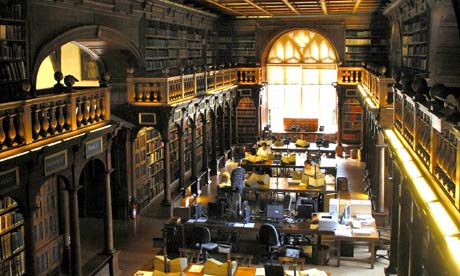Brussels tries to fight Google book plan by overhauling EU copyright law
Contentious plan to digitise world's libraries has made revamp of authors' rights necessary, commissioners say
- guardian.co.uk, Monday 7 September 2009 17.53 BST
- Article history
Brussels began a campaign today to overhaul copyright law in the European Union's 27 countries, partly in response to Google's controversial plan to digitise the world's leading libraries. Viviane Reding and Charlie McCreevy, the European commissioners for media and the single market, launched their campaign to standardise authors' rights amid fears that Google's ambitious project will leave Europe floundering behind the US in the digital learning stakes.

Google has digitised more than 10m books including those in the Bodleian library, Oxford Photograph: John Downing / Rex Features
While Google is awaiting a court ruling next month on its $125m (£77m) settlement with US authors and publishers on its book-scanning project, the situation in Europe is confused because there are 27 different national copyright regimes in the EU.
"We need to take a hard look at the copyright system we have today in Europe," the commissioners said. "Is the present framework still fit for the digital age? Will the current set of rules give consumers across Europe access to digitised books? Will it guarantee fair remuneration for authors? Will it ensure a level playing field for digitisation across Europe, or is there still too much fragmentation following national borders?"
Google has already digitised more than 10m books, mainly in the US but also at the Bodleian library in Oxford and in six other EU countries, as part of the scheme to make the world's libraries and publishers' catalogues searchable online.
Daniel Clancy, a Google engineer and book project architect, said: "The books that represent our cultural heritage should not be left behind in the digital age." He denied that Google was bent on controlling e-publishing or seeking commercial advantage in the digital books business.
"We want other people to get into this business," he said. "One provider is better than none. But many is better than one."
The scheme applies to books where the copyright holders have given their blessing for digital use and for millions of titles that are out of print where copyright has expired or where copyright-holders cannot be identified.
But the German government and German publishers argue that the Google settlement with authors in the US breached German copyright law, while others complained that such control over the national and international cultural heritage should not be in the hands of one private company.
Other critics spoke of monopolies. "We should not let a single US entity dictate an international model of rights recording," said Peter Brantley, a lawyer for the Open Book Alliance formed by Amazon, Microsoft, and Yahoo to fight Google.
Google sought to disarm European objections by offering European representation on the Books Rights Registry, a new body helping to oversee the project, and pledged that European copyrighted books that are commercially available would not yet be included in the electronic libraries.
It maintains it is engaged in the huge project for the public good. Others say such public good should be left to the public sphere. Europeana, the EU digital publishing project which has scanned more than 4m books, is publicly funded.
European officials fear that if the Google project goes ahead in the US, a yawning transatlantic gap will open up in education and research. The commission's answer is to try to compete with the Google project through copyright reform and "public-private partnerships as a means to boost digitisation of books".

No comments:
Post a Comment